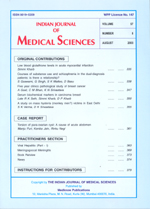
|
Indian Journal of Medical Sciences
Medknow Publications on behalf of Indian Journal of Medical Sciences Trust
ISSN: 0019-5359
EISSN: 0019-5359
Vol. 59, No. 10, 2005, pp. 431-435
|
 Bioline Code: ms05065
Bioline Code: ms05065
Full paper language: English
Document type: Research Article
Document available free of charge
|
|
|
Indian Journal of Medical Sciences, Vol. 59, No. 10, 2005, pp. 431-435
| en |
Angiotensin converting enzyme gene polymorphism in Indian children with steroid sensitive nephrotic syndrome
Patil SJ, Gulati S, Khan F, Tripathi M, Ahmed M, Agrawal S
Abstract
Context:
Nephrotic syndrome is one of the commonest renal problem encountered in children. It is difficult to predict at onset, the clinical course in terms of steroid responsiveness or resistance. Angiotensin converting enzyme (ACE) gene insertion/deletion (I/D) polymorphism has been studied as a predictor of clinical course in common multi-factorial diseases including focal segmental glomerulosclerosis. There is no study available from our country till date to find out any correlation of the steroid response in idiopathic nephrotic syndrome and ACE gene polymorphism.
Aim:
To study distribution and correlation of ACE gene I/D polymorphism in idiopathic steroid sensitive nephrotic syndrome
Setting & Design:
Case-control retrospective study.
Subjects & Methods:
We studied ACE gene polymorphism in 90 consecutive patients (82% males, 18% females) with steroid sensitive idiopathic nephrotic syndrome and 300 normal controls (NC).
Statistical Analysis:
Chi-square test and Fisher′s exact test (for cases with insufficient expected cell frequencies)
Results:
The mean age of onset was 5.3 ± 4 years. Steroid sensitive (SS) patients showed II (SS - 48%, NC - 26%) genotype was more frequent than normal controls (p=0.002). There was no significant difference in genotype frequencies among steroid SS subgroups.
Conclusions:
In our study II genotype was more frequent in steroid sensitive nephrotic syndrome children in comparison to normal controls. Further functional studies with large number of children are required to investigate the role of II genotype in steroid sensitive nephrotic syndrome. Comparison of the genotypic frequency with steroid resistant patients may provide information, which might be useful in clinical practice.
Keywords
ACE gene polymorphism; Steroid-sensitive nephrotic syndrome; Idiopathic nephrotic syndrome.
|
| |
© Copyright 2005 Indian Journal of Medical Sciences.
Alternative site location: http://www.indianjmedsci.org/
|
|
